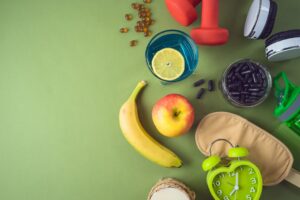 Everyone’s spent a night or two tossing, turning, and struggling to fall and stay asleep. But it can become a problem if it’s happening regularly.
Everyone’s spent a night or two tossing, turning, and struggling to fall and stay asleep. But it can become a problem if it’s happening regularly.
Poor sleep is associated with many conditions, including high blood pressure, heart disease, type-2 diabetes, and depression.
Advertisement
Many turn to doctors for prescription drugs to help with their sleep woes, and those suffering from severe insomnia may benefit from cognitive behavioral therapy. But there are also several healthy sleep habits and natural aids that may help.
Sleep habits and natural aids are easily accessible and worth a try, even if you’re waiting for a prescription or professional help with sleep. According to Johns Hopkins Medicine, more than 60 million Americans suffer from poor sleep quality, so it’s worth exploring every option.
Recent U.S. National Center for Health Statistics research indicates that about 20 percent of Americans take sleep medication, including Ambien, Lunesta, and Sonata. But starting with some basic sleep hygiene may be helpful, cheaper, and safer.
Healthy sleep hours, which means going to bed around 10 or 11 o’clock every night and waking up around 7, allows for a good 7-8 hours of sleep. Keeping the schedule consistent during the week and on weekends is recommended.
Try to avoid naps so that you’re completely tired by bedtime. This sets you up to fall asleep quickly and stay asleep. If you have to nap, do it earlier in the day for 20 minutes max.
Cutting off bright sources of light late in the evening can help prevent the suppression of melatonin, which is the hormone that aids sleep. Instead, use dim, yellow lights. On the other hand, exposure to bright light upon waking in the morning can also help regulate melatonin.
Regular exercise and a cool, dark room can also help. Just try and avoid exercise within a few hours of bedtime.
Advertisement
It’s also possible that sipping on certain beverages may help with sleep. Caffeinated tea or alcoholic beverages, however, won’t help. It takes 8 hours for caffeine to leave your system, and alcohol can impair deep sleep and wake you up during the night.
Avoid caffeine beginning in the late afternoon and alcohol in the evening.
Warm milk, which contains tryptophan, may help. Tart cherry juice may help boost melatonin levels and increase the availability of tryptophan, which can help make you tired.
Some suggest that German chamomile tea may also help with anxiety and sleep quality, but only for people without insomnia.
